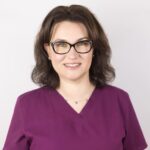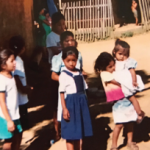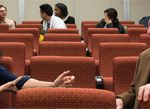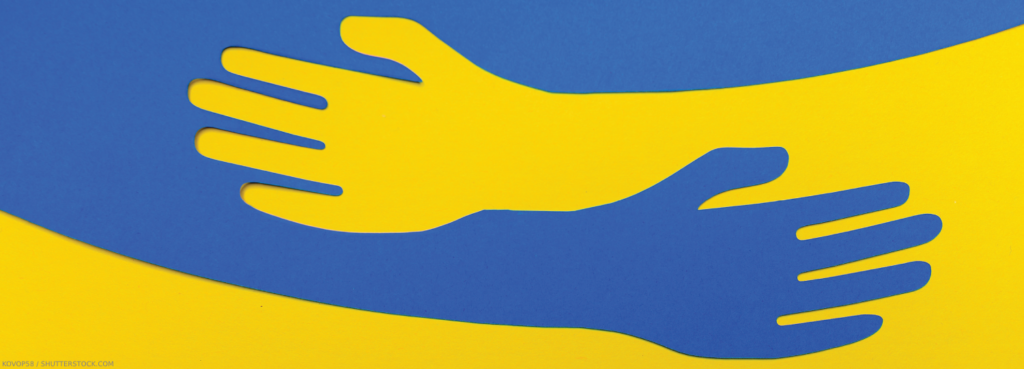
Early in 2022, a few months into the invasion of Ukraine by Russian troops, Paula Rackoff, MD, a rheumatologist and clinical associate professor at NYU Grossman School of Medicine, New York, felt an urgency to head to the region to assist the many refugees fleeing for the border with Poland.
Dr. Rackoff canceled a planned bike trip in Croatia with friends and family and pulled together a small group of volunteers, including three other doctors. Initially, the relief organizations she reached out to said they had enough doctors and thanked her for her interest.
Then Dr. Rackoff contacted the Israeli crisis relief group One Heart. It had already sent young adults to hand out blankets and sandwiches, carry suitcases and generally help refugees cross from Ukraine into Poland, she says.
“When I heard about them I emailed the director, and I said why don’t you send doctors. He said, ‘Okay,’” recalls Dr. Rackoff. “Basically, it was an organization that said ‘Yes,’ so he said, ‘Let’s do it.’”
The dean of the medical school, Robert Grossman, MD, agreed to donate essential medications for the initial 10-day mission. Dr. Rackoff also felt the support of her colleagues, including one doctor who asked to cover for her while she was away on the volunteer mission.
“It was really ‘yes’ all along the way,” she says. “I went twice, for 10 days each time.”
On the Ground
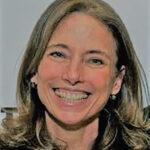
Dr. Rackoff
Instead of the two wheels of a bicycle, Dr. Rackoff landed in Europe with several duffel bags full of medications that might be needed by Ukrainians who arrived at the Polish border with the few possessions they could carry. With four doctors on the first mission, the group saw about 400 patients a week, she says.
“We went to a refugee site outside Krakow. Then we went to three refugee sites on the border of Poland and Ukraine, and then we went into Lviv, also to a refugee site there.”
In Ukraine, the group traveled no farther east than Lviv, which Dr. Rackoff says seemed relatively safe, like any other European city.
“But I think that has to be judged week by week,” she notes. “Their main statues were surrounded by steel and sandbags, but other than that we didn’t see any damage at all.”
The border crossing lines were not as long as in the very early days of the Russian invasion, says Dr. Rackoff. Some of the border traffic included people going back to Ukraine out of necessity or just because they missed being home.
“What was explained to me is that a lot of people depend on their own gardens for their food,” she says. “So if they don’t plant during the summer, they won’t have [food to eat] during the winter.”
The team of doctors attended to mostly women and children because men aged 18 to 60 years old were required to stay in Ukraine to support military efforts against Russian forces. Many of the refugees needed medications to treat hypertension, diabetes, back pain, insomnia and common ailments.
Dr. Rackoff also devoted a day in Krakow to treat people with osteoarthritis, cutaneous vasculitis and other rheumatic-related conditions. She recalls attending to one woman who had frozen shoulder.
“That’s a difficult situation because there was no physical therapy, so I sort of showed her what to do and then eventually she was going to see an orthopedist,” explains Dr. Rackoff.
“The refugees are not [that] sick, but they don’t quite yet have access to medical care,” she says. “I saw one woman who was in tears because she has breast cancer. A year ago, she knew she was in remission, but she can’t get her scans. So it’s heartbreaking.”
One of the doctors and his teenage son, who also volunteered on the mission, speak Russian and served as the group’s interpreters. This doctor had also been with Dr. Rackoff years earlier on a medical mission to Ghana.
The second visit included team members’ teenage children, who came along to volunteer, and a nurse practitioner from NYU who heard about the mission and wanted to participate. That nurse was born in the former Soviet Union and speaks Russian, so she also served as an interpreter, says Dr. Rackoff.
Not Her First Rodeo
Over 25 years, Dr. Rackoff has traveled to many destinations on medical missions, including Nicaragua, South Africa, Israel and Palestine. Her daughter, Maya Rackoff, who was 11 when she accompanied her mother to Ghana, also went on this most recent trip to volunteer.
“It’s always been a real passion of mine,” says Dr. Rackoff about volunteer missions. “My daughter is a sophomore now in college, so I feel like I have a little more free time.”
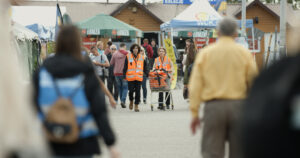
Dr. Rackoff near the Ukraine border with duffel bags of medicine donated by NYU Langone Health. (Click to enlarge.)
Dr. Rackoff plans to return to the Ukraine/Poland border again, probably in the winter. It would be her third visit since the Russian invasion, and interest among her colleagues continues to grow, she says.
The only other time Dr. Rackoff had been in Poland was in 1990 when she went there to honor her ancestors, visit memorial sites and learn more about the Holocaust. It was important to her that an Israeli organization, such as One Heart, sponsored her recent missions to Poland and Ukraine.
“Even though I had volunteered in different countries before, I had a particular connection to Poland and Ukraine because my great-grandparents came from there in the late 1800s,” says Dr. Rackoff.
“It was very important for me personally to go with an Israeli group because of the history of the Holocaust there,” she adds.
It’s a connection she shares with other Jewish doctors with ancestors who experienced the atrocities of the Holocaust.
“That’s where the origin of our families come from,” says Dr. Rackoff. “So to show up, [and be] helping rather than being the victim is just very meaningful.”
In the Moment
Reflecting on the missions to Poland and Ukraine, Dr. Rackoff says her experience was about meeting the moment when thousands of displaced people needed help from others who cared.
“There was this general feeling of we’re really here to do the right thing in a very historic time,” she says.
Catherine Kolonko is a medical writer based in Oregon.
